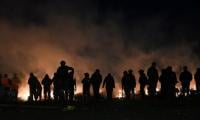Historical grievances
Former US secretary of state Madeleine Albright called the US an “indispensable nation”. But the new reality check by Russia is questioning the veracity of this claim. The so-called indispensable nation is faltering on its value system and showing signs of ‘imperial capitalism’. On the other hand, some countries – including Russia and China – are now creating a new multipolar world.
The tremors of this change are already being felt at the doors of European nations, and Nato seems disturbed. Russian President Putin’s rambling speech right before the Ukraine invasion was full of historical grievances against certain Western conspiracies.
There is a long history of human development and the growth of systems, especially economic systems, as part of evolution and evolutionary processes. Today, the world is witnessing the fast-paced technological revolution and the semantics of this technological world are wonderful. The modern history of human development is linked with the industrial revolution and the development of modern economic systems. The two distinguishable economic systems are socialism and capitalism. But rampant racism deters the creation of civilisation based on equity and justice. Countries are often dependent on their traits, traces and traditions, which are not influenced by the economic system they follow.
Human history is riddled with conflicts. Whether it is the capitalist world led by the US or a world led by China or Russia, it is humanity that suffers in this fight of elite capture. The phenomenon of elite capture was first found in the colonial period when racist nations fought against each other to capture certain territories. Loot and plunder were at their peak in those years. The 20th century saw two world wars, which were the manifestation of a high-class conflict among nations. Modern economic systems also evolved in those years. But human tribalism or racism continued to exist and probably will remain so forever.
The League of Nations was founded soon after World War I by the Paris Peace Conference in 1920 to maintain world peace and security. The primary goals of the organisation were to prevent wars through collective security and disarmament by settling international disputes through negotiations and arbitration. The covenant of the League of Nations was signed on June 28, 1919, as part of the Treaty of Versailles, and it became effective on January 10, 1920. Former US president Woodrow Wilson won the Nobel Peace Prize for his role as the leading architect of the league – However, the US never joined the organisation.
Despite the creation of such an organisation, historical grievances of powerful nations could not stop World War II in 1939, which resulted in the creation of the present-day UN, which is again failing to prevent wars. Two modern economic systems – capitalism and socialism – came into existence, which were at odds with each other in open competition.
The modern history of economics and its downturns started with the end of World War II, when the Bretton Woods System was put in place to adopt unified rules and policies, providing a framework agreement to create fixed international currency exchange rates. World War II provided the US an exceptional opportunity to dominate international financial institutions, although the former Soviet Union (USSR) was equally important to compete with the international market.
This started the first cold war as the ideals of the two superpowers were in stark contrast. The US was a proponent of the capitalist system while the USSR was leading the socialist bloc. The two fought against each other through proxies. One led the capitalist bloc of mainly western European countries and the other led the socialist bloc of eastern European countries. The war ended with the disintegration of the USSR in 1990, and the US emerged as the world’s only superpower.
Keeping in view the historical perspective, we are seeing the onset of a new economic war among the US, Russia and China. Russia, which has a lot of international weight and stature, could never remain isolated for so long.
The US-led Nato wants to fight this war through its newly created proxy to entangle Russia, and it is interesting to see Russia developing a new strong alliance with China that is probably leading the second cold war. Although China is trying to avert this war, Americans are pushing ahead with their plans to forge another alliance like the one at the time of the USSR to defeat Chinese economic influence, which is now threatening US dominance.
The capitalist system resembles racism based on centuries-old legacies of slavery and servitude. Crony capitalism played havoc with almost all economies of the world. The privatisation process was biased and created the elite class, which captured national resources in the name of the laissez-faire economy.
Economic reforms which invite investment from the private sector, attracting foreign direct investment (FDI), are destined to create a new class of elite capture. The privatisation of state-owned entities by a few wealthy individuals is a sign of elite capture at the directions of the World Bank and International Monetary Fund (IMF).
The fact remains that socialism and its economic system were also equally destructive. The state’s ownership of assets was in the hands of a few individuals employed by the state, who started exploiting their positions, leading to elite capture. The system went into disarray, and the state started collapsing and ultimately ended in the disintegration of the USSR. But history never forgets. It is going to repeat the course, giving rise to another turn in the conflict.
Russia is again at loggerheads with the capitalist monarchy led by the US and the West. The new conflict is part of that monarchical system. Nato wants Ukraine to join the alliance, but Russia is rightly scared of its security, and it has come out in the open to keep a check on Nato’s advancement. Hence, the conflict has started another race to compete with each other to settle the score of old grievances. There is an immediate need to control these festering wounds and scars on human history for a better future for everyone.
The writer is an economist.
-
 'Bridgerton' Season 4: Showrunner Talks About Violet's Steamy Romance
'Bridgerton' Season 4: Showrunner Talks About Violet's Steamy Romance -
 John Tesh Recalls ‘uncomfortable’ Backlash Over ’70s Romance With Oprah Winfrey
John Tesh Recalls ‘uncomfortable’ Backlash Over ’70s Romance With Oprah Winfrey -
 Meghan Markle, Prince Harry Problem Was Not ‘work’ During Time With Royals
Meghan Markle, Prince Harry Problem Was Not ‘work’ During Time With Royals -
 Meta Strikes Multi-billion-dollar AI Chip Deal With Google: Will The New Collaboration Pay Off?
Meta Strikes Multi-billion-dollar AI Chip Deal With Google: Will The New Collaboration Pay Off? -
 Gracie Abrams Breaks Silence After Losing 2026 BRIT Award
Gracie Abrams Breaks Silence After Losing 2026 BRIT Award -
 Deon Cole Takes Swipe At Nicki Minaj In Mock Prayer During NAACP Image Awards Monologue
Deon Cole Takes Swipe At Nicki Minaj In Mock Prayer During NAACP Image Awards Monologue -
 Jennifer Garner Reveals The Actress Who 'carried Through Things'
Jennifer Garner Reveals The Actress Who 'carried Through Things' -
 Shamed Andrew ‘awful’ Time As Trade Envoy Is Laid Bare By Insider
Shamed Andrew ‘awful’ Time As Trade Envoy Is Laid Bare By Insider -
 Belgium Seizes Suspected Russian Shadow Fleet Tanker
Belgium Seizes Suspected Russian Shadow Fleet Tanker -
 Liza Minelli Makes Bombshell Claim About Late Mother Judy Garland’s Struggle With Drugs
Liza Minelli Makes Bombshell Claim About Late Mother Judy Garland’s Struggle With Drugs -
 Shipping Giant Maersk Halts Suez Canal, Bab El-Mandeb Sailings Amid Escalating Conflict
Shipping Giant Maersk Halts Suez Canal, Bab El-Mandeb Sailings Amid Escalating Conflict -
 Matthew McCoughaney Reveals One 'gift' He Achieved With Losing Nearly 50 Pounds
Matthew McCoughaney Reveals One 'gift' He Achieved With Losing Nearly 50 Pounds -
 'Scream 7' Breaks Box Office Record Of Slasher Franchise: 'We Are Grateful'
'Scream 7' Breaks Box Office Record Of Slasher Franchise: 'We Are Grateful' -
 Bolivian Military Plane Crash Death Toll Rises To 20
Bolivian Military Plane Crash Death Toll Rises To 20 -
 'Sinners' Star Blasts Major Media Company For 2026 BAFTAs Incident
'Sinners' Star Blasts Major Media Company For 2026 BAFTAs Incident -
 Inside Scooter Braun, Sydney Sweeney's Plans To Settle Down, Have A Baby
Inside Scooter Braun, Sydney Sweeney's Plans To Settle Down, Have A Baby



